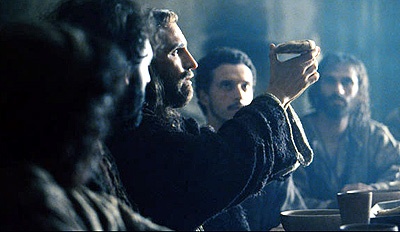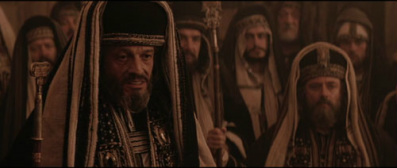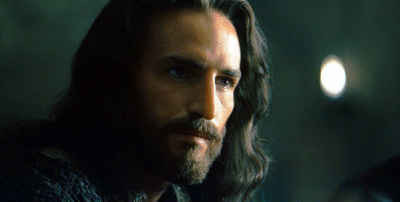 Stewart unabashedly demands that preachers see themselves as more than a talking head for 30 or so minutes on Sunday morning. He wishes to overcome the cultural “inclination to regard the preacher as the purveyor of religious homilies and ethical uplift” and replace it with its original intent, “the herald of the mighty acts of God” (16). His opening chapters reveal that preaching is an eternal art in the dual sense that it has been carried on by men to the present day since Christ walked the Earth, and that its impacts are eternal in the future! For preaching should revolve around one theme and one theme only, the saving Gospel of Jesus Christ. Stewart claims that “the basic message thus remains constant and invariable,” but in the face of an ever changing world “our presentation of it must take account of, and largely conditioned by, the actual world on which our eyes look out today” (11). This sets the stage for the rest of the book, which covers the means by which the Gospel is to be proclaimed. His style and authority feel timeless, putting modern authors to shame, as he rightfully reestablishes the critical importance of preaching the message of Christ “in and out of season.”
0 Comments
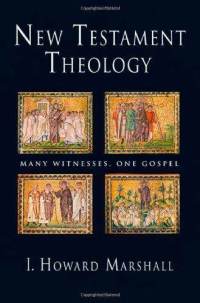 I. Howard Marshall's chapter of Luke in terms of Dogmas, Doctrines, Distinctives, and Details.* Dogmas. Marshall affirms all dogmas key to being “Christian.” The gospel of Christ is central, with repentance and lifelong discipleship to the Trinity as revealed in scripture. He shows that Jesus gave two options: to be or not to be His disciple, the former is costly, but far worse to give up and be the latter (136) and the greatest sin is failure to recognize and respond to God's message (142). While the historical assessment of Luke is postponed (130, 132), the idea that it is “historical fiction” is denounced and Bultmann's existential view is denigrated, positing that the Synoptic Gospels only have force if they are “salvation history” (141, ftnote). However, scripture could be lauded more. The Mission of God is rightly seen as the integrating motif. Marshall bluntly states that Jesus' “mission is summed up as that of the shepherd who goes out to look for and to rescue those who are lost” (138). Marshall even rightly prioritizes eschatological dualism (a Distinctive), questioning Hans Conzelmann's view that the realization of delay led to the church's later motivation to be effective witnesses of the church, instead seeing the early Christians theology as “salvation-historical” right from the start (145). Thus, from the songs of Mary and Zechariah “concerned with God's action for the sake of his people” and “salvation in terms of forgiveness and light” (131) to the passing of the baton at the Great Commission (140), “the character of the career of Jesus is best summed up as mission.” (149). Unfortunately, he seems to allude that this mission was recognized only after the transfiguration (134). Christologically, Jesus is seen as prophet, messiah, and king, with emphasis on prophet (146). Sadly the significance of the “Son of Man” title seems to be downplayed (147), but Marshall sums up Christ's many types and roles as being fulfilled simultaneously in an unimagined reshaping well (149). 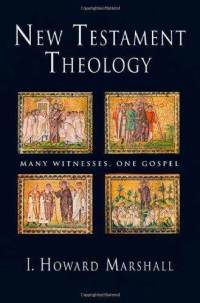 I. Howard Marshall's chapter of Matthew in terms of Dogmas, Doctrines, Distinctives, and Details.* Dogmas. Marshall largely affirms the crucial tenets of Christianity, but often flirts with non-orthodox ideas such as the concept of a “Historical Jesus” (which if seen as an ordinary man deified by history would undermine Salvation). However, Marshall approves of Christ's teaching of God as Father whose “relationship is spiritual rather than being based on creation” (100). He also affirms that Jesus is the Son of God, the Messiah, and third member of the Trinity (113-4) as promised in the Old Testament (116). This orthodox Christology is rounded out with Jesus' deity being pointed to by Jesus as Son in an exclusive relationship with the Father more fully developed in John (103). Marshall also confirms the exclusivity of Christ in stating that the Kingdom of Heaven is the only way (125). Ideas that derail God's plan of salvation, namely that the Great Commission was completed with just Israel in the book of Acts, are mentioned (102), but Marshall seems to tactfully dismiss them. Overview:
The meaning of the word "love" has seemingly been lost in our post-modern age and culture has rushed in to fill the void. However, there is a biblical understanding of the term, at least when it is used in Scripture. So when 1 John 4:7-12 says that "God is Love" it's quite clear that John means that "Jesus Christ on the cross as the propitiation for our sins" is the natural overflow of God's character. Leave Feedback! A sermon I preached for a Homiletics class. I'm still growing as a preacher, so please leave some constructive feedback in the comments! Click "See More" for example feedback:  Religion How does Man receive salvation? This has been the primary question of every culture since Man can remember. Thus, every religion provides a way to save ones self, except Christianity, which states humans cannot save themselves and require a savior.  Faith in Jesus Christ The Gospel Message. Who is saved? While this is not a question Christians should be asking, it is probably the question most frequently asked. The answer is those who've heard and truly responded to the Gospel. The Gospel appears throughout Scripture as it is contextualized for various cultures (Luke 24:44-49; Acts 2:14-39; Acts 17:22-31; 1 Corinthians 15:1-11) and can all be distilled to these basic tenets: Every person has broken their relationship with God due to sin and the punishment for sin is physical and spiritual death (Romans 6:23). However, God's mission has been to seek all humans in order restore His relationship with them. Thus, God became a man, His son Jesus Christ, to take the penalty for sin and offer His right standing so that whoever has faith that Christ took their sin and repents will receive forgiveness for their sins. Those who have been saved are called to proclaim the Gospel to all others. Accepting the Gospel is a spiritual transaction, not an assent of belief, opinion, or understanding. Hence, anyone the transaction has been conducted for is saved, even if their theology of the process is deficient. Consecration occurred Thursday, with divine preparations for the Passover meal and the Upper Room Discourse where Jesus' washed His disciples' feet, identified His betrayer, redefined greatness, foretold Peter's denials, and instituted the Lord's Supper. The Discourse continued covering worldly opposition, the Holy Spirit, and prayer for all believers while walking to the Garden of Gethsemane. Once there, Jesus prayed all night asking God to change the plan, but Jesus accepted His mission as Judas arrived with soldiers to arrest Jesus.
Wednesday was a day of Conspiracy as Judas agreed to betray Jesus. Judas goes to religious leaders asking how much they will pay Him to turn Jesus over to them. They give him 30 pieces of silver and speed up their plans to take Jesus now instead of waiting until the crowds disperse.
On Tuesday, a day of Controversy, the Twelve find the cursed fig tree withered which Jesus uses an illustration for Faith, stating that even a little bit of faith can move mountains. Then Jesus' authority is questioned in the Temple courts by three groups . Deflecting questions on His authority, paying taxes and resurrection, Jesus asks questions regarding John the Baptist, and three parables on Israel's displacement when none will answer, and His relationship to David. Once silence reveals the guilty, Jesus pronounces woe oracles. Later, Christ gave the Olivet Discourse to His disciples to speak prophetically about the temple which they marveled, signs of the end times, and His own second coming as they walked to the Mt. of Olives. Jesus concluded with five parables on being watchful and faithful.
Jesus then returned from Bethany Monday morning beginning a day of Confrontation. First He cursed the fig tree for making a splashy show of leaves but not having any fruit for He was hungry. This was an enacted parable for the Temple cleansing that immediately pursued (this is actually the 2nd Temple cleansing in Jesus' ministry).
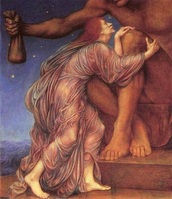 painting by Evelyn De Morgan. Positive & Negative lessons from church history and missions. When greed becomes man's god, his fellow man becomes the sacrifice. Selfish desire has corrupted man for so long it has its own personification,“Mammon,” but its negative effects are compounded when it hinders the gospel. When Europe set out to make the whole world Europe in the 18th century shows how few did so for the gospel, but for trade, conquest, and exploitation.  Ephesians 1:4 - "For he chose us in him before the creation of the world to be holy and blameless in his sight. In love he predestined us to be adopted as his sons through Jesus Christ, in accordance with his pleasure and will..." While studying the book of Ezekiel, I was suddenly overwhelmed with God's love for us. I set to writing and this story of the gospel came out. |
AuthorBrett Yardley: Categories
All
Archives
January 2019
|
